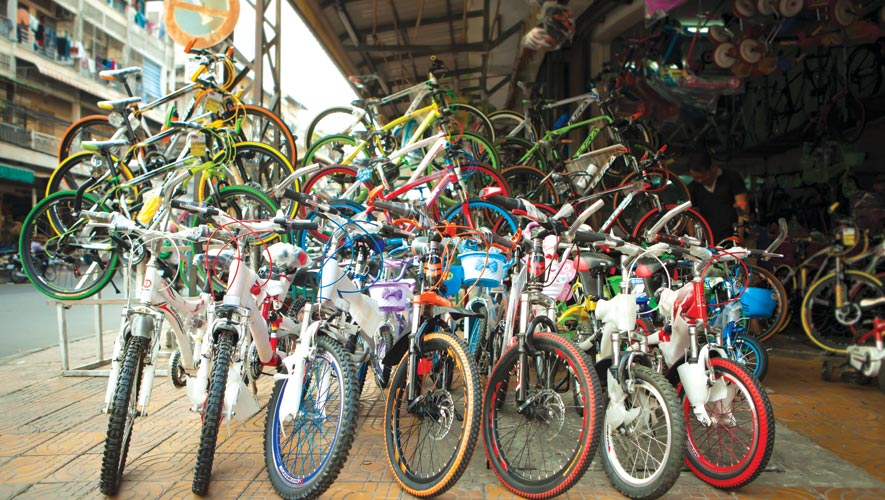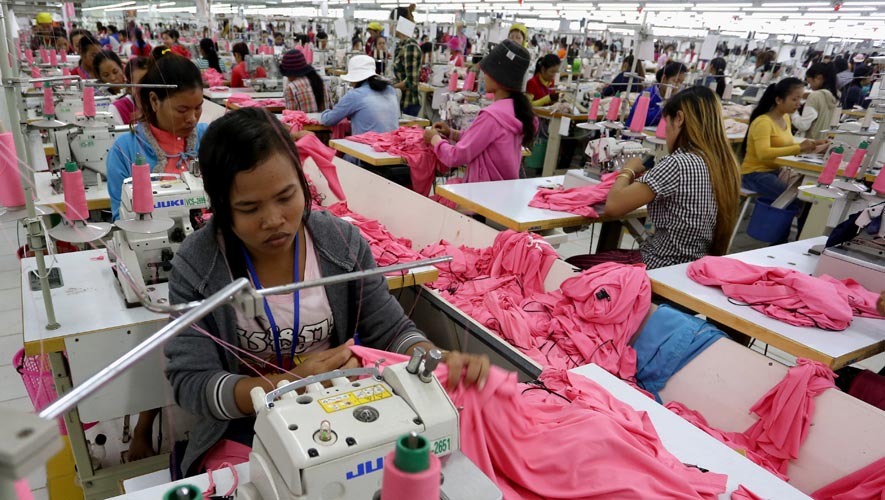A group of bicycle manufacturers in Cambodia has reiterated its call on the European Union to maintain the preference tariff treatment under the “Everything but Arms” (EBA) scheme.
For the latest Cambodian Business news, visit Khmer Times Business
It is urging the EU to consider the possible negative impact, especially on the bike sector, which has been seen growing rapidly in the country – ranking as the EU’s biggest bike supplier by far.
Cambodia Bicycle Coalition (CBC) said it encouraged the EU to retain the Kingdom’s EBA status, in which they said, any withdrawal of the trade benefits will indeed hurt 6,000 workers in the Cambodian bike sector.
“The CBC again encourages the EU to maintain Cambodia’s EBA status because we learnt that it would hurt those workers, their families and setback development in the communities where we operate,” CBC was quoted as saying in a report by Bike Europe, a leading trade journal for the bicycle and E-bike market.
CBC – which represents Taiwanese companies including A&J (Cambodia) Co Ltd, Smart Tech (Cambodia) Co Ltd and SpeedTech Industrial Co Ltd – said it has experienced the first time ever a slight decrease in exporting bicycles to the EU market as a result of the threat of losing the special status of the Kingdom.
The three companies, which their production base located in Cambodia’s Bavet city on the border with Vietnam, exported 835,000 regular bikes from Cambodia to the EU market during the first six month of the year, down 4 per cent over the corresponding period last year.
Although the companies’ exports had experienced a slight decrease during the period, it still makes the Kingdom’s ranking the EU’s biggest suppliers of regular bicycles. The Kingdom took over from Taiwan, which exported 546,000 of regular bicycles to the EU in the same period.
Moving out if EBA revoked
The EBA trade scheme – which allows the Kingdom to export everything except ammunition duty-free and quota-free to the European Union – is now under review over perceived setbacks to human rights and democracy following the dissolution of the CNRP, the country’s main opposition party, in 2017.
CBC said the EU market accounts for 80 per cent of its production and it benefits 14 percent in duty-free exports to the market.
And if the EBA is removed, its production will be relocated to other countries.
“Without it, CBC manufacturers would face an EU tariff of 14 percent on its exports. Other regional suppliers such as Bangladesh and Myanmar would not and a free trade agreement with Vietnam will soon give that country secure duty-free access to the EU,” CBC said.
However, it noted CBC will continue to engage with EU decision-makers to appeal for continued EBA eligibility for Cambodian bicycle production.
Kent International, a large US-based bicycle manufacturer, has reiterated its commitment to the Kingdom, saying it would continue to produce from Cambodia even if it were to lose preferential access to the US.
Bike giant to stay in nation
Arnold Kamler, chief executive officer of Kent International, said the company’s bikes are eligible for duty-free treatment in the US because 35 percent of components are local and because the frames are manufactured in the Kingdom.
“Europe is not a consideration for us for this move,” he wrote. “We are focused on Cambodia for the USA market. Today, with 35 percent content and making the frames in Cambodia, we would be eligible for duty free treatment to the USA. But even if it goes away, we see costs in China skyrocketing over the next five years. Labour costs in China have been increasing 15 percent per year and this trend will continue.”
“Even if we lose these preferences in the US, we would not move because we see costs in China skyrocketing in the next five years,” he emphasises.
The company produces about 3 million bicycles a year. Once its factory in the Kingdom is operational, about 30 percent of Kent International’s annual production will come from Cambodia.
“We had hoped to begin this spring but so many obstacles have been thrown in the face of the people who are building the factory, which have delayed the construction of the factory. It now looks like the first production will not begin until about 10 months from now.”
The company’s factory, located about 16 kilometres from downtown Phnom Penh, is expected to begin operations next year.
“We are also impressed with the workmanship at the textile factories that we visited in Cambodia,” he added.
“We have a very large business of almost 3 million bicycles a year that we sell to the USA, Canada, Australia and Japan. We used to have a nice business in Europe before the dumping duties from China were implemented and have not tried to re-engage doing bicycle business in Europe in more than 15 years because, during this period, we became so busy supplying these other markets,” Mr Kamler explains.
When asked whether he will be joining the CBC to engage with EU decision-makers to appeal for continued EBA eligibility for Cambodian bicycle production, he said he has no plan to take part.
“I have no plans at the moment to do so because we are so challenged by the unprovoked trade war [between China and the US], which we now find ourselves embroiled in.”
To qualify for duty-free status in the EU, at least 40 percent of a bicycle’s components must be produced in Cambodia, said Seang Thay, spokesman at the Ministry of Commerce.
Mr Thay said Cambodia now manufactures a few of the components used in bicycles but that it also imports them from Vietnam and Thailand, among other countries.
According to Mr Thay, most bicycle manufacturers are located in the Tai Seng Bavet Special Economic Zone, less than 10 kilometres from the border with Vietnam.
Last year, Cambodia exported 1.5 million bicycles to the EU, worth a combined $331 million, according to a World Bank report released in May. In 2017, the Kingdom became the largest bicycle supplier to the EU market, overtaking Taiwan.
Government reaction
Early this year, the government announced measures last week aimed at lowering the cost of doing business, which the premier said would allow Cambodia to remain competitive if the EU withdraws EBA.
Government spokesman Phay Siphan says the government is attempting to save the EBA because it has benefits to the Kingdom’s economic growth.
“Our stance is that we are trying to keep the EBA but, if not, let it be,” Siphan said. “Our efforts are also focused on finding justice for our nation.”
Prime Minister Hun Sen recently concluded his trip to Eastern Europe and is bringing home the support of three countries with regard to an ongoing review of the Kingdom’s EBA arrangement.
During his trip to the Czech Republic, Hungary and Bulgaria, Mr Hun Sen discussed th
e review with the leaders of each country, lobbying for support to retain the EBA, in which the countries expressed intent to support the Kingdom’s special trade status.




